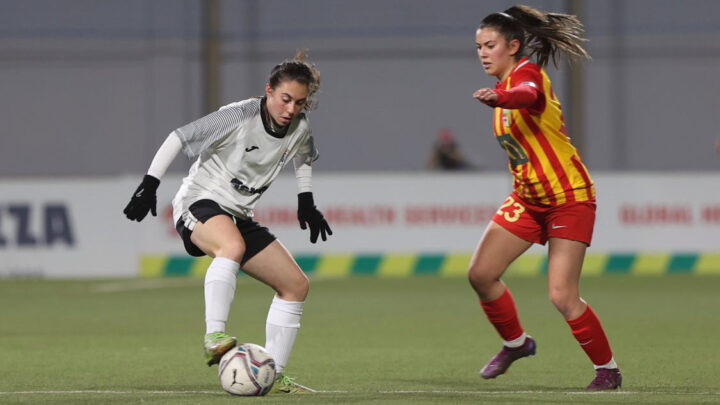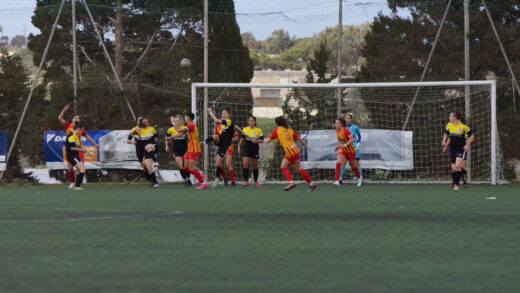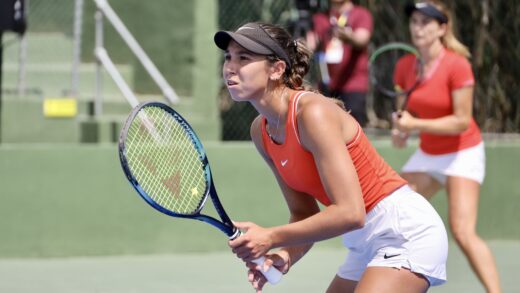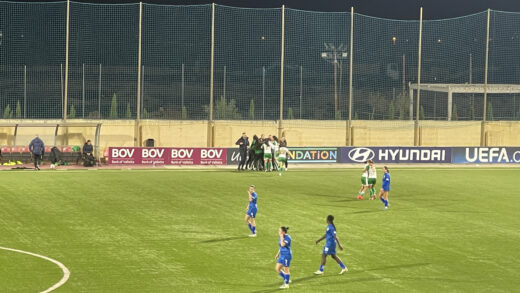Speaking with Kayleigh Chetcuti, you get the sense of someone who lives and breathes Hibernians FC, whose target is firmly set on lifting titles with the club and ensuring a steady stream of like-minded youth players.
Having joined the youth ranks back in 2013, at the time when Hibernians FC were dominating titles, I asked Kayleigh Chetcuti about beginnings with the side, before swapping to Swieqi United orange as Hibernians FC disassembled their team shortly following the 2018/2019 season. Chetcuti is one who presents somewhat of a unique insight into Hibs’ return this year, having stayed on as a coach with the youth side in the Hibernians Academy during her time playing with the Owls.
We discuss her take on Hibs’ return season, her start in coaching and her role in the Hibernians Youth Academy going forward. Finally, we discuss the growth of the game in Malta.
Beginnings & Playing Role
Eleanor Saliba (ES): What got you interested in playing and how did it evolve into joining Hibernians FC?
Kayleigh Chetcuti (KC): I started playing at school when I was nine years old. The boys encouraged me to start playing with them at St. Georges Football Club in the boys’ team since it was close to where I lived. The year after there was a tournament at school and I was chosen to go to with the National Team Academy. On turning twelve I had to find a women’s team and I chose Hibernians FC. I have spent nearly all my playing time with Hibernians FC since then, except for a brief spell at Swieqi United.
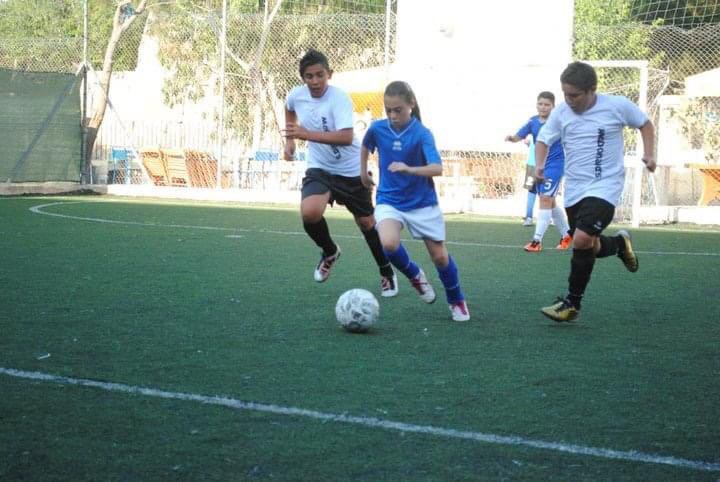
ES: When starting out, did you have a dream role that you wanted to play and how did this change over time?
KC: At the time I supported Manchester United and was obsessed with Wayne Rooney so of course wanted to play as a striker. With time, it shifted to Cristiano Ronaldo, and I was playing more as a winger. However, now I play mostly as a midfielder which I enjoy.
ES: In fact, this year you were mostly observed playing in central midfield and perhaps a few times on the width. Do you have a preferred position to play in based on your development?
KC: In general, I put the team first so if I am needed in a position that may not necessarily be my favourite I will try to help the team as best I can.
ES: You seem to have a good eye for building attacks, assisting goals but also scoring and assisting from set-pieces. How have you built this awareness on the pitch?
KC: I watch a lot of football and I am always keen to learn. So, I have a habit of asking even if it is perhaps a position that I do not necessarily play in, so that I build an understanding of the game as a whole. I have also been lucky to play alongside experienced players from whom you can learn a lot.
ES: Speaking of players with experience. In your early years, you were a part of a Hibernians FC side that dominated Maltese football. How did that build you as a player?
KC: I think I was lucky to have been a part of the setup at such a young age because it was the strongest side in Malta, so I learned a lot. As I moved to the senior team, I was around players such as Dorianne Theuma, Jade Flask, Charlene Zammit and Shona Zammit, who are of course still playing and from whom I learned a lot.
Moving From Hibernians to Swieqi United
ES: Hibernians pulled out of the league between 2019 and 2022, during which time you signed for Swieqi United. Firstly, how did it feel to leave a club that you had been around since your early years?
KC: I was disappointed to have to make that step as Hibernians meant a lot to me, so I always dreamed of returning to Hibernians. In fact, while playing with Swieqi United, I stayed as a coach with Hibernians FC Academy to help develop youngsters so that one day Hibernians could return to the league and now, we have.
ES: During your time at Swieqi United, was there perhaps a difference in club culture to Hibernians FC that needed getting used to or was it a smooth transition?
KC: It was not too much of a problem since we moved as a complete team, including our coach, Keith Gouder. So, the style of play was similar and there was not much change.
ES: In the period when you transitioned from Hibernians to Swieqi United, Birkirkara started to emerge as a more dominant force. At the time with Swieqi United you were finishing in second or third place, how do you reflect on this time with the club?
KC: Perhaps I would say that the feeling was different, it is not to say that I did not want to win the league, but I think to me the will to win it with Swieqi United was different to that with Hibernians. I think in my head I always longed for a return to Hibernians and sort of dreamed of lifting my first senior title in Hibs’ white, which I still hold on to.
Return to Hibs & The Season
ES: Hibernians FC returned rather strongly this season. Firstly, what do you think of the first season back from your perspective?
KC: I think it was a positive league season, considering that several players joined from different clubs, so we needed time to gel. I think it was easier than we expected, and we quickly formed a good team spirit and set out to meet our objectives. I would say we are a young squad with perhaps little experience, but if we keep working the way we have been doing we will be able to do well.
ES: In the league, you had an interesting mid-table battle with Mgarr United (L3-1; D1-1; L1-0) and Raiders Lija (W2-0; W3-0; W3-0) during the season. There was also a fantastic come-back against Birkirkara FC but could not quite make enough ground in time, but defeated Swieqi United in your final game of the league. What do you make of this?
KC: I think the trajectory is evident in those scorelines. We did not have success against Mgarr United in the league, but then laid it all out in the Knockout quarter-final. Against Birkirkara we managed to score twice in the second half, which was something that the Stripes had not suffered for a long time, and we finished the league commitments with a win against Swieqi United. So, I think, it shows that by the end of the season we were challenging more and hopefully next season we will be able to do even better.
ES: Considering the proximity with Mgarr United in the league table and how well-contested your matches were towards the latter part of the season, what would you say made them particularly difficult to beat for you?
KC: I think if I were to try to pick out some reasons, perhaps the two matches we lost were played at the Mgarr United ground, so it is home for them. The pitch is smaller, and I think as a team we do better to fill out larger spaces so perhaps that plays a role. However, I think in the end it is football. You win by scoring; you have to give merit to the winning team. Perhaps they were better on the day or even if the match was quite even they were the ones to score the goal and ultimately that is what gets you the result.
ES: As you mentioned, you started gelling more as the season progressed. I also noted changing formations for games which worked well. From my perspective, you carried this momentum well into the Assikura Women’s Knockout which enabled you to secure the first result this season against Mgarr United. I would say the Greens had more chances, but Hibernians were more efficient in front of goal. Do you think it was a game that reflects the growth of the team in the way you secured the result?
KC: Yes, we managed to find the goal early on, so at that point we focused on being compact at the back and ensuring we do not concede. In the second half, they were also battling against the wind, but we managed to secure the result.
ES: In that game, you scored the winning goal from a direct free-kick and were also close with another one in the second half. Knowing that you were having a difficult game with few chances, how did you deal with that pressure at that moment?
KC: I approached it in a calm manner as much as possible because I think if you put too much pressure you set yourself up for failure. The free kick that got us the goal was early on as well, so I knew we still had plenty of time to get the result if I did not score. However, I generally approach set pieces or penalties as calmly as possible, irrespective of the match.
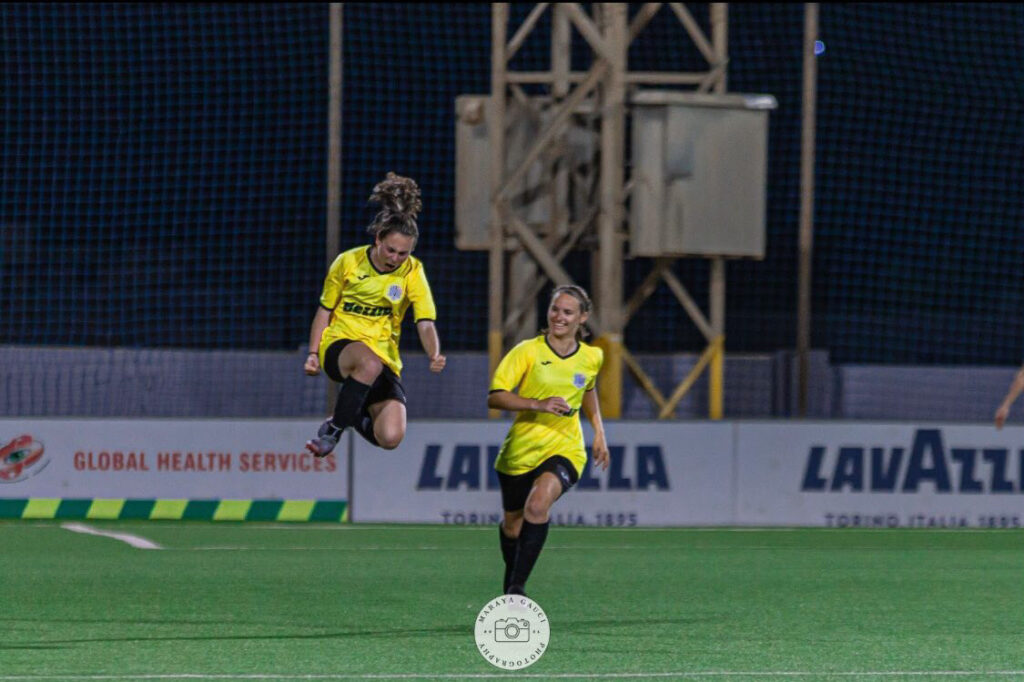
ES: The win enabled you to progress to the semi-final where you faced San Gwann FC, which you won convincingly. How did it feel to captain the side for the first time in the match?
KC: It was a proud moment to captain the team of the club which is so dear to me. I knew there might be a chance but was not really expecting it. Of course, once confirmed I was happy, but wearing the armband or not I was always going to give my all and do my best to be a leader on the pitch.
ES: The final against Swieqi United was a match that did not go the way you wanted, as a team because of the result, but also for you personally since you were forced off with an injury. However, what were your feelings during the final, considering Hibernians’ history and the fact that you were playing against a club that you used to play for?
KC: It was a final that had a special feeling to it. We were expecting a lot of supporters who came in big numbers (at least in my experience in Malta) which made the final extra special as I had never played in such an atmosphere in Malta before. Personally, the fact that we were playing Swieqi United as an ex-club of mine was not too much of an issue as I was fully focused on doing my best for the club I currently represent, Hibernians. I was nervous at the start of the match so I tried to calm myself down in the first few minutes as I knew I would not be able to play my best if I did not manage to. Unfortunately for me, I could not finish the match because of injury. In terms of the game itself, I think we had good chances but unfortunately, we scored late. I think if we had scored a bit earlier, we could have gotten the draw, and then who knows perhaps even the win, but we took our chance late.
ES: How much of an effect do you think that final league match had on the build-up to the Knockout final for both sides mentally?
KC: I think both of us were ready for the challenge. There is no denying that they have a lot of experience in their side, whereas for most of us, it was our first time playing a final. I think you must factor in that experience as well when looking at the match and the result.
Coaching
ES: When did you first start coaching?
KC: I started when I was sixteen, I used to assist with the U8s. Then when I moved to Swieqi United to play, a lot of the U15s and U17s moved there too. However, there were a few who did not want to go so I stayed as a coach alongside Coach Amy Busuttil. As an academy, we grew to exceed thirty-five players even before Kirkop’s team joined us. We took part in the U16 for a year but now as Hibernians FC, we will be able to participate in all categories.
ES: At sixteen you were quite young to think about coaching. Was this something you wanted to particularly do, or did you take an opportunity as it came along?
KC: At the time I was asked if I was interested in helping with coaching and I accepted without perhaps expecting I would enjoy it as much as ended up doing. However, as I started coaching, there was satisfaction in seeing children enjoy it and seeing their progression, which made me want to do more so I kept going.
ES: What would you say is the most important thing when coaching children at such a young age?
KC: My first priority is that children learn the basics, but I also focus on having a good team spirit. Women’s football is growing a lot. My opportunities when starting out were fewer, so my aim is to teach them as best I can so that their opportunities are greater than what I had.
ES: My understanding is that your role within the Hibernians FC Academy is growing further. Could you explain what you will be doing going forward?
KC: Last year I was coaching the U14, this year I will be coaching the U13 primarily due to the changes happening in the category levels. However, this year I will also be taking on the role of the ‘Grassroots Coordinator’ with the Hibernians’ Women’s Team Academy, which means I will be taking care of the categories of the U11 and U13 and in charge of organising friendlies and events. I will be doing this in coordination with the Women’s Team Technical Coordinator Kenneth Costantino and our Academy Football Director Andrei Agius.
Football in Malta
ES: If one considers the past, we had a long time where Hibernians was a dominant force, and now recently Birkirkara have been sweeping titles. I have no doubt that as a player you want to win all the titles you could, but during the seasons do you feel that it is getting more difficult to win points off each other? Do you feel the competition get tougher?
KC: I think yes growing up it was all Hibs, then it shifted to Birkirkara dominance. I think this year there was a good challenge between Birkirkara and Swieqi United. I would say, we as Hibernians and Mgarr United we were quite close to each other and provided a challenge. I think looking back whereas before the league used to be won in Round 2, this year it was much closer into the final matches, even to fight for third and fourth place. I think there is a positive change, in terms of players having better coaches, training structure which is allowing players to develop better from a young age. Both of us as Hibernians and Raiders (now Valletta FC Women) have young squads and were competitive, which shows this development in how the league season progressed.
ES: In Malta the league winners go on to participate in the UEFA Women’s Champions League (UWCL). However, the women’s game features no UEFA Women’s Europa League or even the UEFA Women’s Conference League, which means that there is no such opportunity to play abroad for those teams placing second or third. As a player would you relish having a Europa League for the women’s game, or do you view it as a double win that if you get the league victory it pairs it with getting into the UWCL?
KC: I think it is a difficult question to answer in that it also depends on teams who are playing in bigger leagues to also apply pressure in creating for example the UEFA Women’s Europa League. I think it would be great to have such a competition, but for now I choose to focus on winning the league with the target of experiencing the UEFA Women’s Champions League as well, which would be a first for me.
ES: There is more effort into growing the game and encouraging more girls to participate. From your experience as a player and in coaching with the Academy, what would you say we are doing well to attract more players into football?
KC: I would say that perhaps four years ago the game did not get as much support, but since then, there is more effort being put into making it visible to children, such as the after-school events being held by the Malta Football Association (MFA). ‘Fun Fit’ Football helps as well where we go into a mixed class at school, and you spend a session of forty minutes teaching children a sport. That way they are introduced to different sports, including football, and if interested they can then join a nursery. So, I think all of this is helping to make football visible to both girls and boys and attracts more to the game. Even if you look at nurseries where perhaps there is not a women’s team, you find more instances of girls joining even the boys’ team which perhaps before was not as common. I was the only girl playing with St. Georges so looking back I got questioned more for it. Though there are still some clubs where unfortunately this may happen, I think overall it is less common.
ES: Once players enroll into the youth academies, how do you tackle the challenge of keeping players interested and coming back?
KC: I would say that throughout the season I try to create a lot of events which do not necessarily relate to football but are focused on building a good relationship between everyone. I think this helps children also grow friendships and in doing so creates a bond that expands beyond the game of football, which makes it less likely that they leave. Of course, you will have one or two that leave and go to other clubs, but I would say from my time with Hibernians FC it is not so common.
ES: Speaking as a player, do you feel any difference in matches in terms of crowd support over time?
KC: I encourage younger players to come to watch the senior’s games, but the matches at eight in the evening on a school night are not adequate for children to be able to come to watch. Older supporters would perhaps make that effort, but it is difficult to ask this of children. I think this year I still managed to convince some parents to come with their children, but of course, you get feedback on how difficult it is for them to get the young ones to wake up for school the next day. In this regard, this year will be different because of the changes that will happen, so perhaps we will get higher crowds. I would say that the Knockout final had really great numbers which was fantastic for me to see and experience. I think it has been a while since I saw so many people for a local competitive match. Hibernians’ ultras generally make a good atmosphere but to see the numbers is fantastic.
ES: In the context of always finding ways to improve the game, what do you think is an aspect that is not getting too much attention, but you would address in search of growing the game?
KC: I think I question why we play in only two pitches when you consider that there are many grounds in Malta. The two pitches we currently use are both in the north, so it would be good to play in some grounds in the south, to attract more from these areas of Malta. I think this reflects also in the number of clubs in the south because currently, the only club in the south is Hibernians. So perhaps playing games in these areas makes the game more visible there, attracts more players from these areas and hopefully it can inspire more clubs to create women’s teams there too.
ES: Any final comments, perhaps on the Hibernians’ Academy that you would like to add?
KC: I think as an academy we have a good setup, and we will be competing in all categories. At younger ages, we focus on development but from U16s upwards we do not form a team to simply fill a category. We are Hibs, we go out to compete and to win.
I would like to extend thanks to Kayleigh Chetcuti for taking the time to meet with me to be able to bring you this special feature.
Thank you for reading. If you enjoyed this please consider sharing it with a friend who you think would like it. You may also want to read the interview with Birkirkara’s Ann-Marie Said. Stay tuned for more.
Lead Image: Elena Grech
